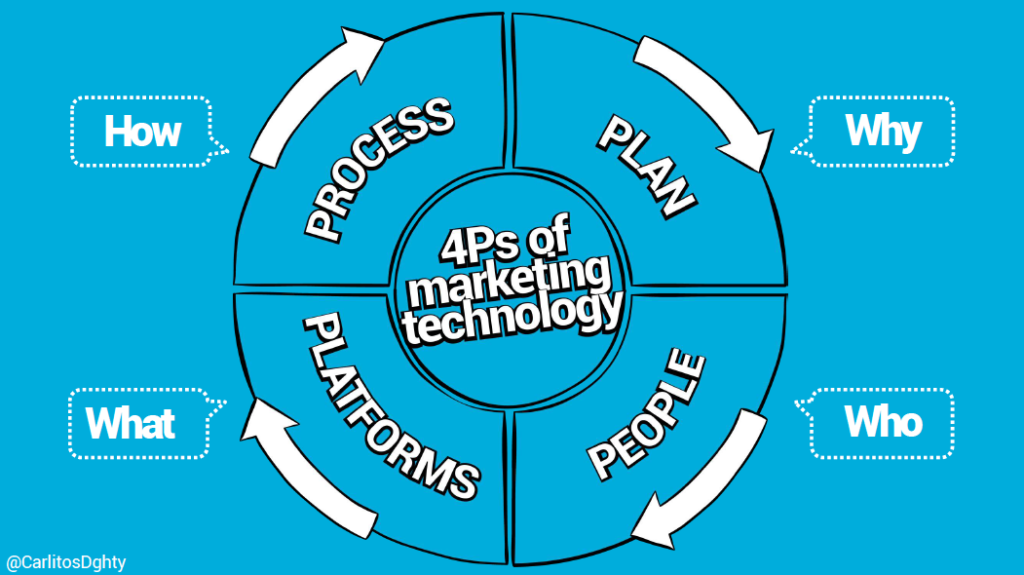What are the challenges in MarTech for publishers?. SIPA UK recently ran a Round Table discussion, with owners and leaders of B2B media and information businesses, to discuss their priorities in managing MarTech, and some experiences where it has added value.
Importance of MarTech for publishers
Carlos Doughty, Founder of MarTech Alliance, emphasised the importance of MarTech, which now accounts for 26% of marketing budgets. A common mistake is to think about MarTech as just about platforms, when in fact the skills of the team and the processes used are just as important. Plus connecting to the overall business and marketing strategy.
Carlos looks at four aspects of Martech maturity: Plan, People, Platforms & Process. Depending on the strategy, you will need a combination of skills within the team. This can be achieved through training, new hires and using consultants. Better to start with the customer journey than going straight to selecting tech platforms. Important considerations are how tech platforms work together, and how data flows through the business.
Marketing automation is not the whole answer. Good targeting and the right copy is critical. Better to be “data informed,” ie prepared to question the data and make a judgement, rather than be slavishly “data driven.” These days there is a risk of drowning in analytics, with an overload of dashboards.
What are the challenges publishers are facing?
Attendees shared some of their main challenges
- Low level of maturity/expertise within marketing teams
- Platforms not integrated (need to use manual processes)
- How can small businesses replicate the benefits of martech on a shoestring
- Only one person knows the system well (and they now have a new role)
- Changes in business model (eg ads to subs) so need new information
- Have cobbled together low-cost platform: it works well, but now business growing and hard to scale
- Made decision to go with a sophisticated platform (eg Salesforce or MS Dynamics) before being ready to make the most of it
- In larger businesses, having to integrate with slow, cumbersome enterprise systems (no good for fast moving events)
What approaches seem to be working?
Julian Thorne of the Big Wheel Consultancy outlined a process for creating a robust martech solution:
– Agree on strategy and long-term objectives
– Develop some use cases, and design an experiment that solves the problem, using low-cost software (but that could potentially scale) – and iterate
– If it can’t scale then you have a great brief for a martech vendor
Ideas and tips from attendees experiences:
- Keep it simple to start with and try the low-cost platforms
- SaaS vendors have more of an incentive to help their customers succeed
- A key value of martech is the ability to know when you should have a conversation with a customer eg if they have viewed certain content, or if subscribers look like they are becoming less engaged. Helps sales teams prioritise.
- In b2b media businesses with events and subscriptions, signals from one can help create opportunities to cross sell the other
- In one niche business, decided not to use Salesforce, instead chose a basic platform that suited the market
- Don’t be afraid to have an interim setup that works for business now, and then it is relatively easy to swap to a higher spec vendor later.
- Recognise that you may not be able to replicate the process you use now if you want to fit in to the features of a new platform. It might be easier than you think to adapt your workflow, rather than search for tech that matches exactly
- The answer to your marketing problem might not be new platforms: are you doing the best you can with the tech you already have? Better to include a few manual processes than go through the pain of introducing a new platform
- Beware of marketing teams operating in a silo. Ideal to involve the whole business eg via workshops, and see how the whole process can be adapted and how data and martech can be used
- Ask vendors about examples of integration and processes that work for other clients – may be easier to adapt what you do than to search for an exact match
- If a large company has slow systems, consider creating a little “bubble” for a new product/project/event with its own martech
- Share information on low/disengaged users with the whole organisation – then if anyone encounters them they know to have a conversation
- Resist pressure from incoming marketing directors that the tech is the reason marketing is underperforming, you can usually do better with the tech you have, and changing platforms is disruptive.
***
The conclusion was that it is essential to be clear on strategy and how an investment in martech will support that. And the skills of the team, both staff and freelances, are crucial to making the most of the data you have. But also that a simple solution can be created out of low-cost platforms; there is no obligation to use the most sophisticated solutions.
SIPA UK runs quarterly round tables, with one or two speakers and an open discussion with 10-20 attendees. If you would like to attend a round table or have an idea for a topic or speaker, please contact the Chair Julian Rose. SIPA is part of US-based trade association SIIA.
About the author
Carolyn Morgan has bought, sold, launched and grown specialist media businesses across print, digital and live events. A founder of the Specialist Media Show (sold in 2014) she now advises media businesses large and small on their digital strategy through her consultancy Speciall Media.
Carolyn is a member of the SIPA UK Committee

